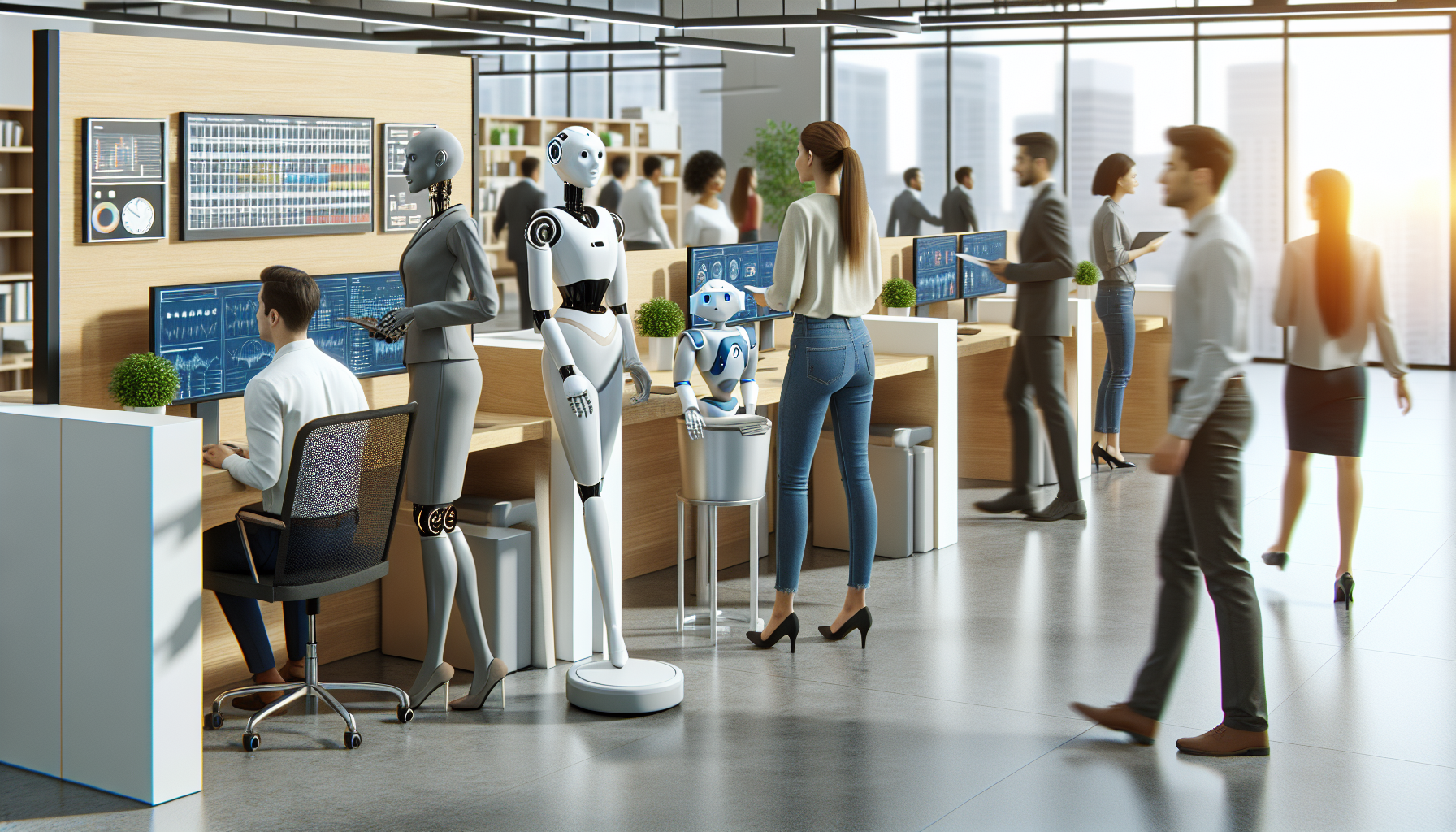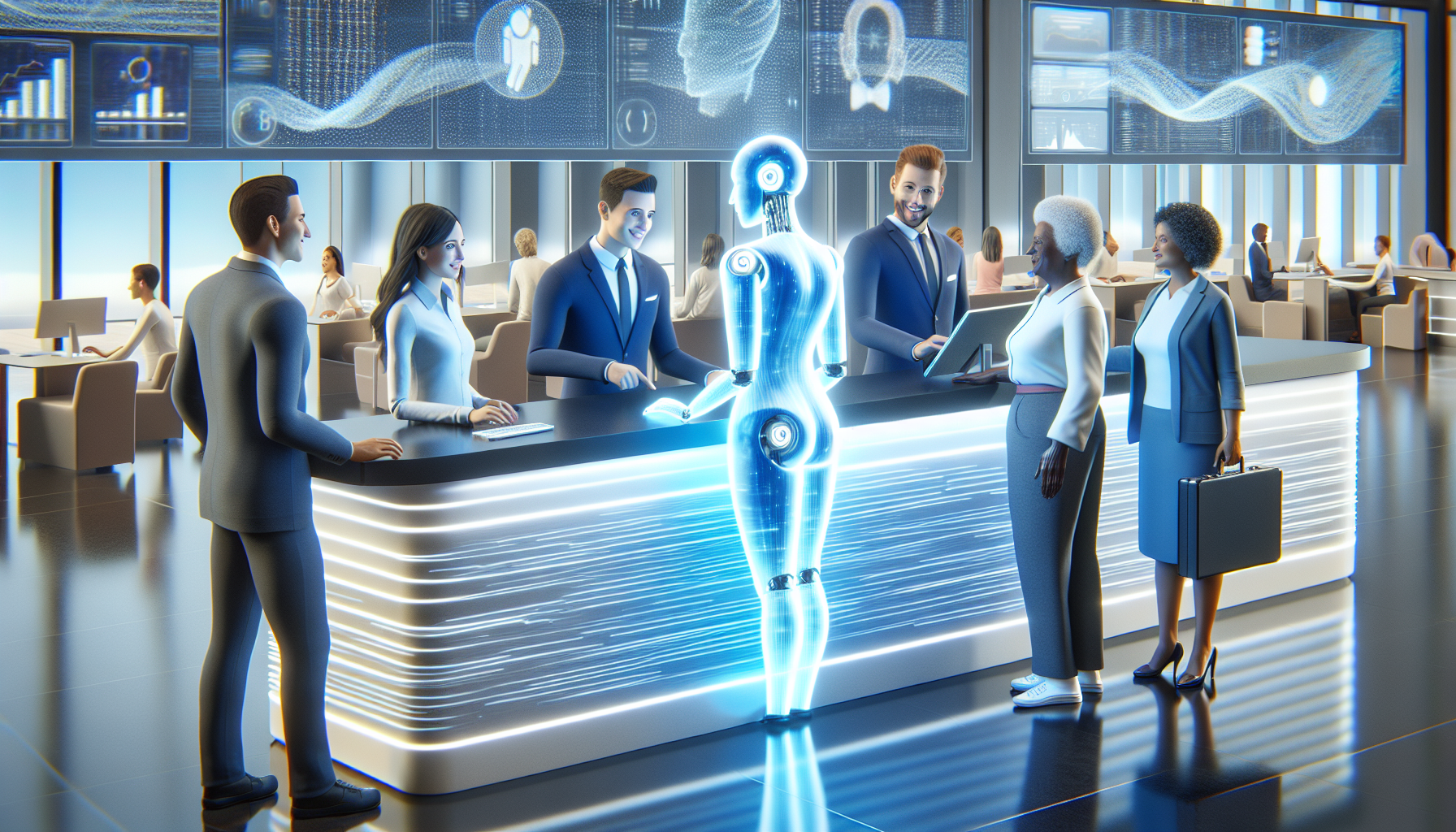
As we venture deeper into the digital era, Artificial Intelligence (AI) continues to profoundly shape our everyday experiences and this includes unique advancements like AI receptionists. An AI receptionist doesn't require conventional skills of customer service personnel—instead, they leverage smart programming to interpret and respond aptly to a broad array of customer requests, and perform essential administrative tasks such as call routing, appointment scheduling, and information dispensation.

Empowered by natural language processing (NLP) and machine learning, AI receptionists are impressively efficient—they operate round-the-clock, reduce human error, diminish overhead costs, and offer superior convenience with their swift and seamless customer service interactions. However, like all technology, AI receptionists also present new challenges in terms of ethical considerations which concerns the wider impacts they have on employment patterns, data privacy, and human contact.
The idea of substituting human receptionists with AI in businesses implies the potential for major layoffs, leading to concerns about fairness and the social responsibility of companies. Meanwhile, AI receptionists, like all AI, are data processing systems—and they process a lot of sensitive, personal data. This raises questions about the appropriateness of using AI in positions of trust. Lastly, the concern on human contact elaborates on the challenges of creating AI that can replicate the empathy and warmth a human receptionist can provide.
In the following sections, we delve deeply into these ethical considerations of implementing AI receptionists within businesses. Probing each concern in detail, we aim to shed insight into how ethics should guide technological advancements in customer service.
Implementing AI Receptionists holds a wealth of benefits, chiefly in improving operational efficiency and ensuring consistent customer service. But like any technological application, its adoption also carries potential ethical implications. It is crucial to strike a balance between implementing AI tools while considering the ethical facets linked to this technological shift.
On the positive side, AI Receptionists are available 24/7, which is especially beneficial in fostering a globalised business structure. AI technology does not operate within the limitations of standard office hours, facilitating the offer of continuous service. This relentless availability ultimately aids in increasing customer satisfaction and loyalty.
Moreover, AI receptionists assure high efficiency and consistency. Unlike their human counterparts, they will not have a bad day or lose patience, ensuring customers continually receive impeccable service. Plus, they can handle multiple tasks simultaneously, drastically boosting productivity.
However, embracing AI technology doesn't come without potential pitfalls. Central among these concerns is the fear of job displacement. With AI performing tasks traditionally handled by human employees, there is a risk of job losses. As we increasingly replace human labour with machines, we must navigate this change responsibly to avoid impacting the livelihoods of those workers.
Alongside this, there's the risk of depersonalization of service. AI, despite its intelligence, cannot replicate genuine human connections, and the risk of missing the personal touch in communication is real. It's a critical aspect to consider, particularly for industries where emotional engagement is paramount. Furthermore, the ethical implications of AI's potential bias - from data input to decision-making processes - adds another layer to this intricate debate.
In conclusion, when deploying AI Receptionists, businesses must weigh the significant benefits against the potential drawbacks. A balanced approach - considering both commercial gains and the wider ethical implications - will be essential.
Artificial Intelligence (AI) technology is indisputably weaving its intricate threads throughout the fabric of various sectors, including the corporate world. One prime instance is the implementation of AI receptionists — a technological advancement that while streamlining business operations, also raises complex ethical queries. A key ethical concern is its potential impact on employment. Specifically, the technology threatens to displace human employees, exacerbating issues of unemployment and income inequality.

According to a McKinsey Global Institute report, over the next decade, AI could displace approximately millions of jobs worldwide. In revealing the magnitude of this disruption, such staggering statistics make the ethical argument for responsible and equitable implementation of AI technology even stronger.
But is there a middle ground that allows businesses to reap the benefits of AI receptionists without exacerbating unemployment issues? The answer lies in the concept of retraining and redeploying affected employees.
Retraining involves upskilling employees whose roles are threatened by AI. Companies can provide a range of training programs designed to equip these workers with the skills needed in the AI-driven landscape. For instance, a receptionist could be retrained in customer relationship management or data analysis, positions that further value human touch or creativity.
Redeployment then involves placing these retrained employees into new, relevant roles within the same organization. Importantly, both retraining and redeployment demand corporate commitment, signifying a shift away from productivity concerns alone to include employee welfare, ultimately leading to ethical employment practices.
The ethical challenges relating to AI receptionists are significant, and they necessitate thoughtful solutions. While AI brings efficiency and innovation rewards, it weighs heavily on our responsibility to ensure equitable opportunity and progression. Retraining and redeployment of affected workers can be viable solutions, mitigating displacement fears while paving the way for a more inclusive AI era.
As artificial intelligence make strides into various sectors, it is imperative that companies consider one of the more critical ethical issues provoked by these advances: privacy and data security. AI receptionists are not an exception - they collect, process, and often store large amounts of sensitive data, presenting a centralised target prone to data breaches.
Consider, for instance, the nature of data that AI receptionists frequently handle. Personal identification details, financial components, unique behavior patterns - all the confidential elements lie at the heart of most interactions. IBM Security reveals a single data breach, on average, cost companies $3.92 million in 2019, a clear indication of the financial impact of careless handling of data by these AI entities.
The risks aren't purely monetary. Data breaches result in a considerable loss of trust, putting both the business's reputation and customer relationships at stake. According to PWC, 69% of consumers believe companies are vulnerable to hacks and cyberattacks, making it a crucial ethical responsibility for businesses to safeguard user data.
Therefore, advance planning and constant vigilance are required to guard against data breaches and ensure the ethical use of AI receptionists. Firms need to develop comprehensive privacy policies, outlining the extent and limits of data collection and usage. Moreover, effective data encryption methods must be installed to protect sensitive information during transmission and storage. Updated data breach response plans should also be at the helm, preparing companies to act swiftly and decisively in the event of a breach. The future of AI receptionists lies not only in its technological sophistication but in its ability to operate within the confines of ethical data handling and protection standards as well.
In the rapidly advancing world of technology, AI systems, specifically AI receptionists, have become more commonplace. It's crucial to understand that these systems, just like humans, can carry biases in their decision-making processes. A computer doesn't have innate biases - these are programmed in, largely via the data used to train the system. This inadvertent incorporation of bias can impact customer interaction, potentially reflecting negatively on the company's reputation.

Several high profile cases have shed light on the bias issue in AI. For instance, Amazon's AI recruiting tool had to be scrapped when it was discovered it preferred men for technical jobs. This wasn't an intentional decision by Amazon; instead, the system learned it from the existing status quo in the dataset used for training.
Therefore, fairness in AI needs to be stressed. A consciously unbiased dataset and regular fairness evaluations are essential to prevent mishaps. In addition, providing transparency, control, and appeals mechanisms to those impacted by an AI decision would also result in a more ethical AI.
Despite the challenges, various organizations, such as the AI Fairness 360 project by IBM, are spearheading the efforts to develop tools to help address AI bias. Similarly, the idea of 'algorithmic audits' has been steadily gaining traction, where an independent body assesses the fairness of an AI system.
In summary, as we welcome this future where AI receptionists become norm, it's crucial that we consider the ethical implications meticulously, ensuring these systems are not only efficient but also fair and unbiased. With appropriate steps, we can optimize these innovative technologies while safeguarding fairness, thus minimizing the likelihood of perpetuating biases.
As the industry matures, it is crucial to create a predictable, secure environment for AI to thrive without compromising on the ethical elements, such as privacy, autonomy, equality, transparency, and accountability. The implementation of AI Receptionists is no exception to this rule, requiring a comprehensive, future-oriented ethical guidelines and policy framework.
Firstly, privacy is a critical topic in this digital era. Addressing how AI receptionists collect, store, and use the personal data of customers is paramount. Following the guidelines outline in data protection regulations such as the General Data Protection Regulation (GDPR) is a good starting point.
Next, respecting autonomy in client interactions is essential. To ensure this, we need to disclose when a customer is interacting with an AI system, providing them the freedom to choose whether they want to proceed or not.
On the subject of equality, it’s important to ensure that AI receptionist services do not unintentionally embed and perpetuate harmful biases. OHCHR guidelines on non-discrimination on the grounds of race or other demographics can provide valuable insights.
Regarding transparency, AI systems should be transparent in their decision-making processes. The OECD AI Principles emphasize the same, underscoring the need for transparency and interpretability in AI systems.
Lastly, accountability in AI receptionists' actions is vital. Companies must introduce mechanisms to hold AI systems accountable for their decisions, taking corrective actions when necessary. Adherence to the Guidelines on Artificial Intelligence and Data Protection by the Council of Europe could ensure this accountability.
In conclusion, AI technology's success depends greatly on ethical considerations in their implementation. With the proper framework in place, we can ensure the responsible use of AI receptionists without compromising on the imperative moral aspects we value.
Start your free trial for My AI Front Desk today, it takes minutes to setup!








